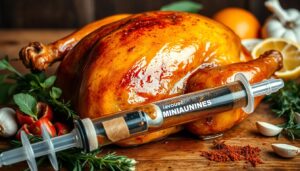When cooking a turkey, you want it to be moist and full of flavor. A turkey injection recipe can help. It involves injecting marinades into the meat to boost taste and texture. This method is popular among both home cooks and chefs because it spreads flavors evenly.
Using a turkey injection recipe saves time compared to traditional marinating. It ensures your turkey is juicy and flavorful. Whether you’re new to cooking or have years of experience, this technique can improve your turkey dishes.
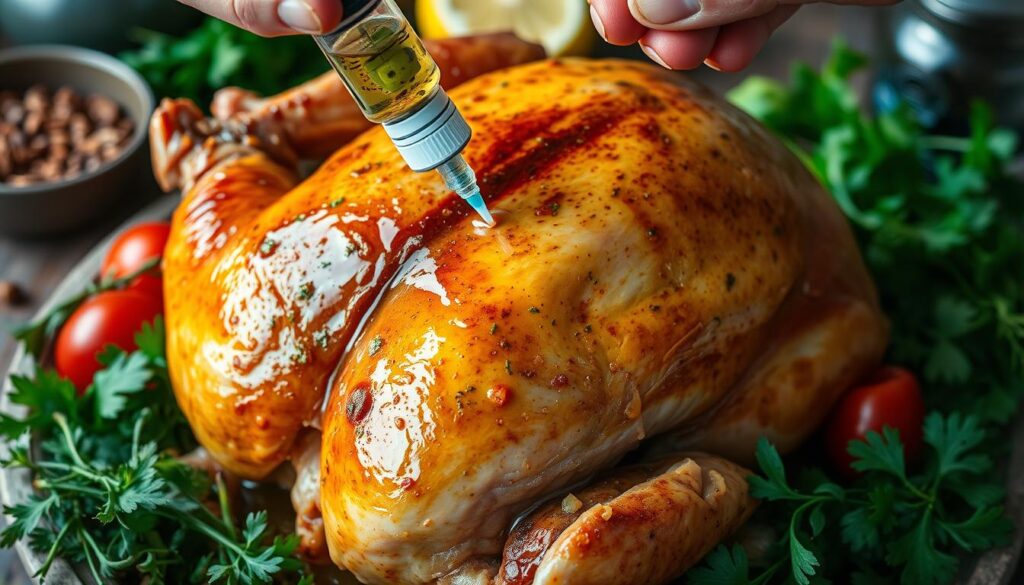
Introduction to Turkey Injection
Marinades for injecting turkey add flavor and moisture. The right recipe can make your turkey a hit. It’s a way to create a memorable meal that everyone will love.
- Using a turkey injection recipe can help achieve moist and flavorful results
- Marinades for injecting turkey can be used to add flavor and texture to the meat
- Turkey injection recipes are a great alternative to traditional marinating techniques
- Injection methods allow for a more even distribution of flavors throughout the turkey
- With the right recipe, you can create a delicious and memorable meal
Understanding Turkey Injection Marinades
Injecting turkey marinade into the meat can greatly enhance flavor and moisture. This method helps avoid a dry turkey. It makes the turkey tender and juicy.
To inject turkey, pick a marinade that matches the meat’s natural taste. You can choose from broth-based, oil-based, or herb-infused marinades. Each offers a unique flavor. For instance, broth-based marinades add a savory taste, while herb-infused ones bring a fresh flavor.
Benefits of Injecting Turkey
- More evenly distributed flavor and moisture
- Tender and juicy final product
- Can help prevent dry, overcooked turkey
Types of Injectable Marinades
- Broth-based marinades for a rich, savory flavor
- Oil-based marinades for a moist and tender texture
- Herb-infused marinades for a bright, refreshing taste
How Injection Affects Meat Texture
Injecting marinades changes the turkey’s texture. It adds moisture and flavor, preventing dryness. This is key for large turkeys, ensuring they stay juicy even when fully cooked.
Essential Equipment for Turkey Injection
To get the best results with your turkey injection, you need the right tools. You’ll need a reliable injection syringe. These come in metal or plastic and have either multi-hole or single-hole needles. Choose a syringe based on your turkey’s size and the marinade you’re using.
A bigger turkey might need a syringe with a longer needle. This ensures the marinade spreads evenly.
You’ll also need other important tools. These include:
- Mixing bowls for combining your marinade ingredients
- Measuring cups for accurate measurements
- Food-safe gloves to prevent cross-contamination
These tools help you prepare and inject your turkey safely. Always use fresh, high-quality ingredients. Also, follow proper food safety guidelines when handling and storing your turkey.
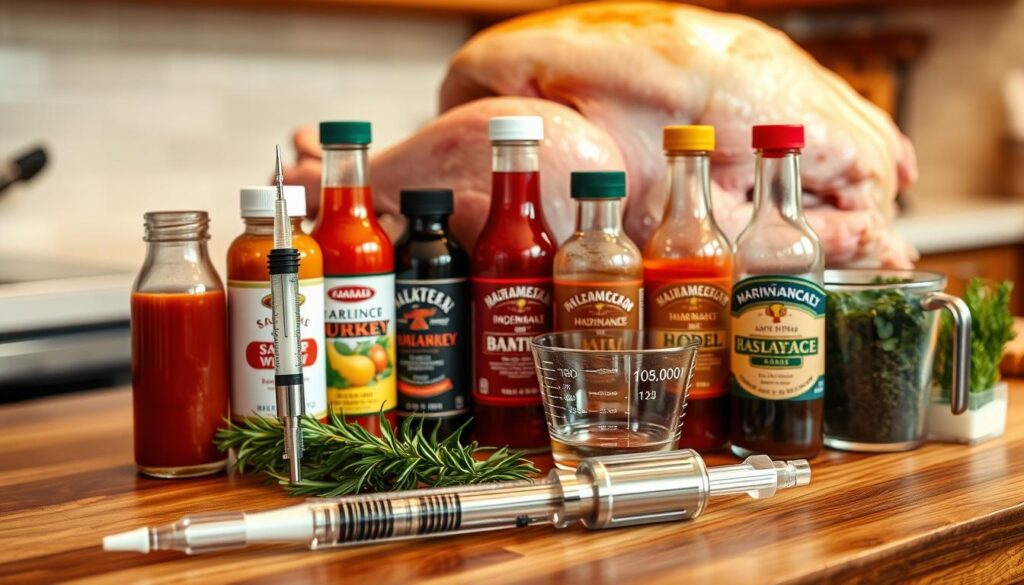
Investing in the right equipment and using a good turkey injection recipe will give you juicy, flavorful results. With practice and patience, you’ll become great at turkey injection. You can then try different marinades and seasonings to make unique and tasty dishes.
Basic Turkey Injection Recipe
To make a juicy turkey, you need a good turkey injection recipe. This basic recipe is a starting point. It lets you try different marinades for injecting turkey. The secret to a great recipe is mixing flavors right and making sure the marinade is smooth.
Base Ingredients List
Here are the key ingredients for a basic turkey injection recipe:
- 2 cups of chicken broth
- 1/4 cup of melted butter
- 2 tablespoons of your favorite herbs (e.g., thyme, rosemary, or sage)
- 1 teaspoon of garlic powder
- 1 teaspoon of onion powder
- Salt and pepper to taste
Mixing Instructions
To make the marinade, mix chicken broth, melted butter, herbs, garlic powder, onion powder, salt, and pepper in a bowl. Stir until everything is well mixed. This basic recipe is a good base for trying out different flavors and ingredients.
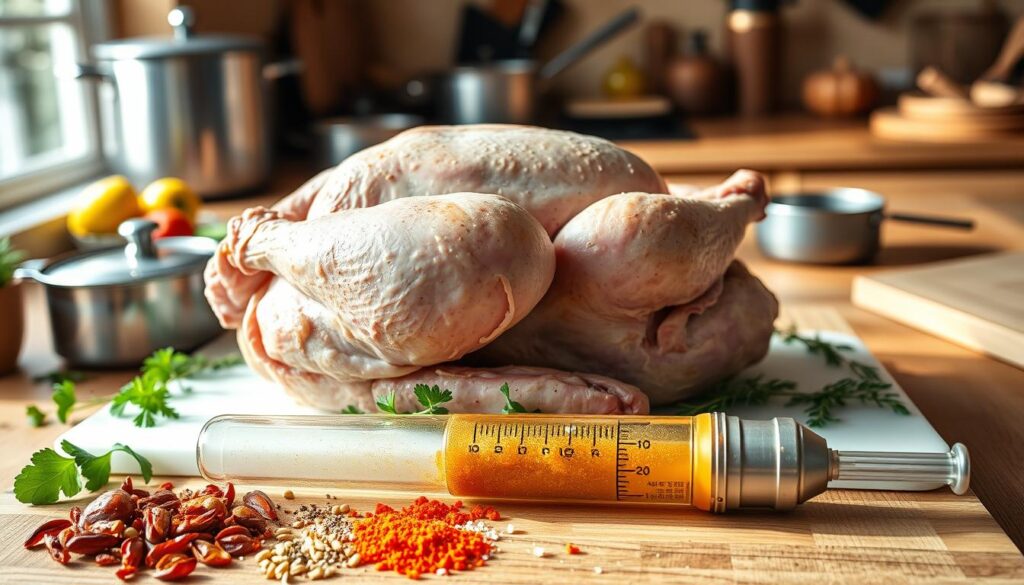
Storage Guidelines
If you make the injection mixture ahead of time, store it in a sealed container in the fridge. It can stay good for up to 24 hours. Always keep food safe and handle the marinade right to make sure your meal is tasty and healthy.
| Ingredient | Quantity |
|---|---|
| Chicken broth | 2 cups |
| Melted butter | 1/4 cup |
| Herbs | 2 tablespoons |
| Garlic powder | 1 teaspoon |
| Onion powder | 1 teaspoon |
| Salt and pepper | To taste |
Advanced Flavor Variations
Once you get the hang of the basic turkey injection recipe, it’s time to try new flavors. These can make your dishes even better. You can add unique tastes like herbs, citrus, or spices to impress your guests.
Here are some ideas for advanced flavors:
- Herb-infused: Mix fresh herbs like thyme, rosemary, or sage into your turkey ,injection recipe for a fragrant and savory flavor.
- Citrus-based: Add a squeeze of fresh lemon or orange juice to your injecting turkey marinade for a bright and tangy taste.
- Spicy: Incorporate diced jalapenos or serrano peppers into your turkey injections recipe for a bold and spicy kick.
When trying new flavors, balance is key. Pair your turkey with sides and wine for a complete meal. For example, herb-infused turkey goes well with roasted veggies and dry white wine. Spicy turkey pairs with sweet and tangy BBQ sauce.
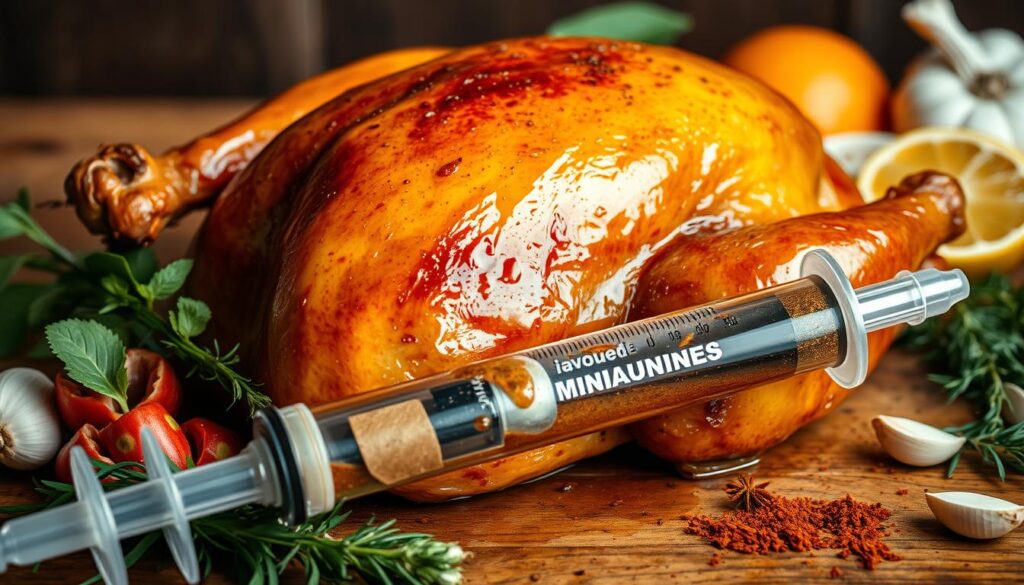
Exploring these advanced flavors will make you a pro at injecting turkey marinade. You’ll create meals that wow your family and friends. So, don’t hesitate to try new things and find your favorite flavors. With practice, you’ll soon be making delicious turkey injection recipes like a pro.
Step-by-Step Turkey Injection Technique
To make a juicy and flavorful injected turkey, follow a step-by-step guide. When you inject into turkey, make sure the marinade spreads evenly. This means you need to be precise to avoid too much in one spot.
Before starting, know the turkey’s layout to find the best spots to inject into turkey. Use a turkey diagram to mark the meaty areas like the breast and thighs.
Injection Point Mapping
Here are some tips for mapping injection points:
- Find the breast and thigh areas, which are the meatiest parts of the turkey.
- Look for areas with less fat, as they absorb marinade better.
- Use a meat thermometer to check the marinade’s depth.
Proper Depth Guidelines
When injecting, aim for the right depth to avoid skin damage. The rule is to inject 1-2 inches deep, depending on the turkey’s size.
| Turkey Size | Injection Depth |
|---|---|
| Small (10-12 lbs) | 1 inch |
| Medium (12-14 lbs) | 1.5 inches |
| Large (14-18 lbs) | 2 inches |
By following these tips and using the right technique, you’ll get a delicious injected turkey. It’s sure to wow your guests.
Best Practices for Deep-Fried Injected Turkey
Deep-frying your turkey needs to be safe first. A turkey injection recipe deep fried right requires focus on details. You’ll want a crispy outside and juicy inside. The turkey’s size and oil temperature are key.
For a great deep-fried turkey, keep these tips in mind:
- Go for a turkey that’s 12 pounds or less. This size helps with even cooking and keeps the oil from spilling over.
- Heat the oil to 375°F to 400°F. This temperature gives you a crispy outside and a juicy inside.
- Use a thermometer to check the oil’s temperature. Also, a timer is key to cook the turkey just right.
A deep fried turkey can be a tasty and memorable dish. But, safety is very important to avoid accidents. Always use a sturdy deep fryer with a secure lid. Never leave it alone.
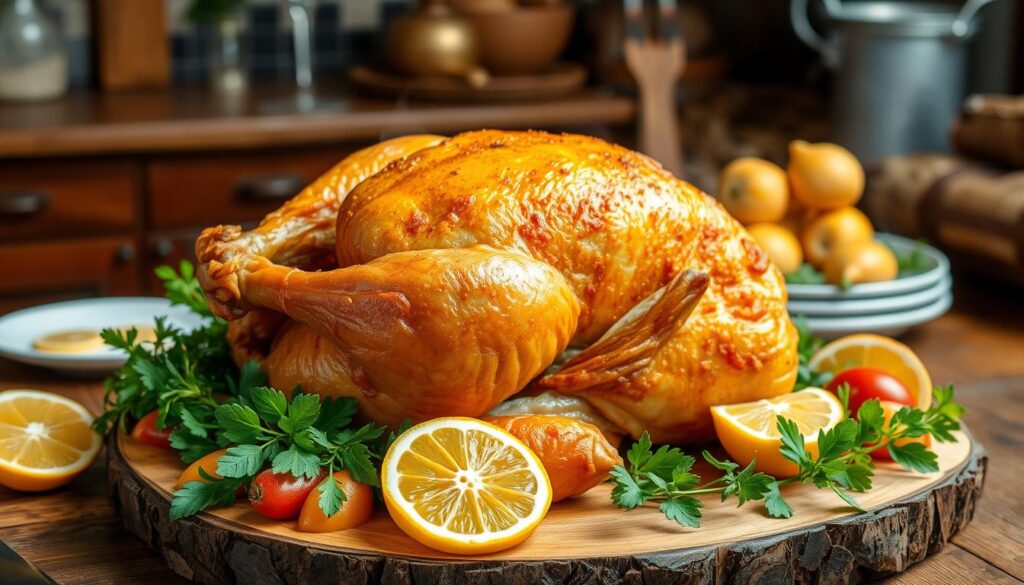
To get the best turkey injection recipe deep fried, dry the turkey with paper towels before cooking. This step helps the turkey cook evenly and prevents oil splatters.
| Turkey Size | Cooking Time | Oil Temperature |
|---|---|---|
| 8-12 pounds | 3-5 minutes per pound | 375°F – 400°F |
By following these tips and being careful, you’ll enjoy a tasty and memorable deep fried turkey. It’s sure to impress your guests.
Common Mistakes to Avoid
When you inject turkey marinade, it’s key to avoid mistakes. Over-injecting can make the turkey too salty or soggy. To avoid this, stick to the injecting guidelines and use a meat thermometer to check the turkey’s temperature.
Another mistake is using marinades with big particles. These can block the needle and make injecting uneven. Strain the marinade through a fine-mesh sieve or blend it to make it smooth.
Here are some more tips for injecting turkey marinade:
- Always use a clean and sanitized needle and equipment to prevent contamination
- Inject the turkey at the right temperature, as injecting too close to cooking time can cause the meat to become tough
- Use a gentle and consistent injecting motion to avoid tearing the meat
By following these tips and avoiding common mistakes, you can make a deliciously flavored and moist injected turkey. This will impress your family and friends. Always remember to prioritize food safety and handle the turkey and injecting equipment with care.
Troubleshooting Your Turkey Injection Process
Working with a turkey injection recipe can sometimes lead to common issues. We’ve gathered some practical tips to help you overcome these problems. Whether it’s for a special occasion or just to improve your cooking, these tips will guide you to success.
Common problems include leakage, uneven flavor, and equipment issues. Let’s explore some solutions for these concerns:
Leakage Solutions
Leakage might happen if you’re injecting too fast or using the wrong needle. To avoid this, inject slowly and evenly. Also, use a high-quality needle made for meat injection.
Flavor Balance Adjustments
Adjusting the flavor is easy. If it’s too mild or strong, tweak the ingredients. Adding more herbs or spices can enhance the flavor of your turkey.
Equipment Issues
Equipment problems, like a clogged needle or a faulty injector, need quick fixes. Clean or replace the needle as needed. Ensure your injector is working right before using it.
By using these troubleshooting tips, you can overcome common issues. Always choose high-quality ingredients and equipment. Don’t hesitate to experiment and adjust the recipe to your liking. With practice and patience, you’ll make dishes that impress everyone.
| Common Issues | Potential Solutions |
|---|---|
| Leakage | Check injection technique, use high-quality needle |
| Uneven flavor distribution | Adjust marinade ingredients, inject slowly and evenly |
| Equipment issues | Clean or replace needle, check injector for proper function |
Timing and Food Safety Guidelines
When you’re injecting turkey marinade, timing and food safety are key. You can inject the turkey a few hours to a couple of days before, depending on your recipe and storage. This ensures your turkey stays fresh and delicious.
It’s important to keep the injected turkey in the fridge at 40°F (4°C) or below. This stops bacteria from growing and keeps your turkey fresh. When you cook it, make sure it reaches 165°F (74°C) to avoid food poisoning.
Here are some key food safety tips:
- Use only safe ingredients and clean equipment when injecting the turkey.
- Keep the turkey cold at all times, below 40°F (4°C).
- Cook the turkey to at least 165°F (74°C) for safety.
By following these guidelines and using your favorite injecting turkey marinade recipe, you’ll enjoy a juicy and flavorful injected turkey. You’ll also keep food safety in mind.
Always put food safety first when handling and cooking your turkey. This way, you and your loved ones can enjoy a healthy and tasty meal.
| Storage Time | Refrigerator Temperature | Internal Cooking Temperature |
|---|---|---|
| Up to 2 days | 40°F (4°C) or below | 165°F (74°C) or above |
Conclusion: Mastering Your Turkey Injection Technique
Turkey injection is a game-changer for juicy, flavorful results. By mastering this technique, you can make your holiday meals and special occasions better. The secret is to try different recipes and find the flavor you like best.
Whether you like classic herbs and spices or something bolder, there’s a lot to try. Let your creativity shine with injected turkey. Each time you succeed, you’ll get better and impress your loved ones.
Keep this guide handy as you get better at turkey injection. With the right tools and practice, your turkeys will be so good, everyone will want more. Happy cooking!
FAQ
What are the benefits of injecting a turkey with a marinade?
Injecting a turkey with marinade offers several advantages over just marinating the surface. It ensures flavors and moisture are evenly spread, avoiding dry spots. This makes the turkey juicier and more flavorful.
What types of injectable marinades can I use for my turkey?
You can choose from various marinades for your turkey. Broth-based ones keep the meat moist. Oil-based marinades add rich flavors. Herb-infused marinades let you tailor the taste to your liking.
What equipment do I need for turkey injection?
You’ll need a few tools for injecting your turkey. An injection syringe is key, available in metal or plastic with single or multiple holes. Also, use mixing bowls, measuring cups, and gloves to handle the marinade safely.
How do I properly distribute the marinade throughout the turkey?
To spread the marinade evenly, first plan where to inject. Focus on the breast, thighs, and drumsticks. Inject at the right depth, avoiding skin. Move the needle to cover all areas without over-saturating.
What considerations should I keep in mind when deep-frying an injected turkey?
Deep-frying an injected turkey requires careful attention to safety. Use the right oil temperature and choose a turkey size that fits your fryer. Adjust cooking time for the added moisture to get a crispy outside and juicy inside.
What are some common mistakes to avoid when injecting a turkey?
Avoid over-injecting and using marinades with big particles that can block the needle. Also, don’t inject too close to cooking time. These tips will help you get the best results.
How far in advance can I inject my turkey, and how should I store it?
You can inject your turkey 2-3 days before cooking. Just make sure to store it in the fridge properly. Keep it at a safe temperature and covered to prevent contamination.
For more ricipes you can visit our website karamilla sweets

